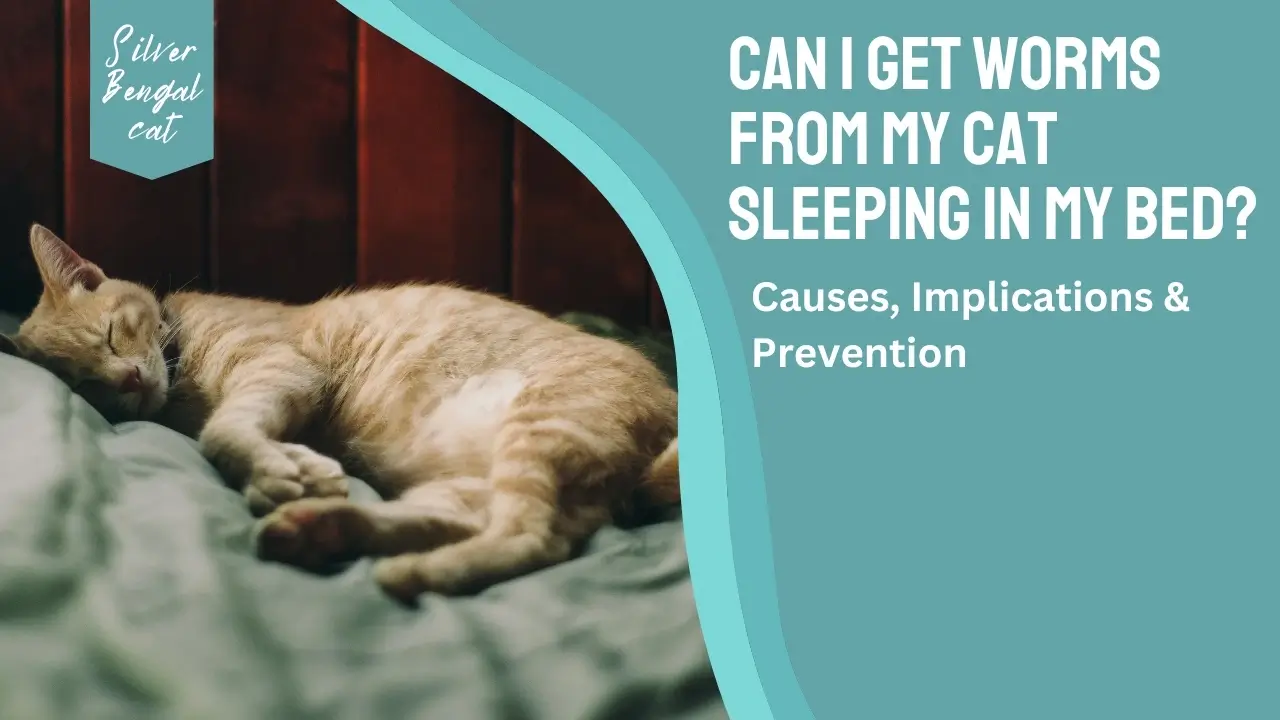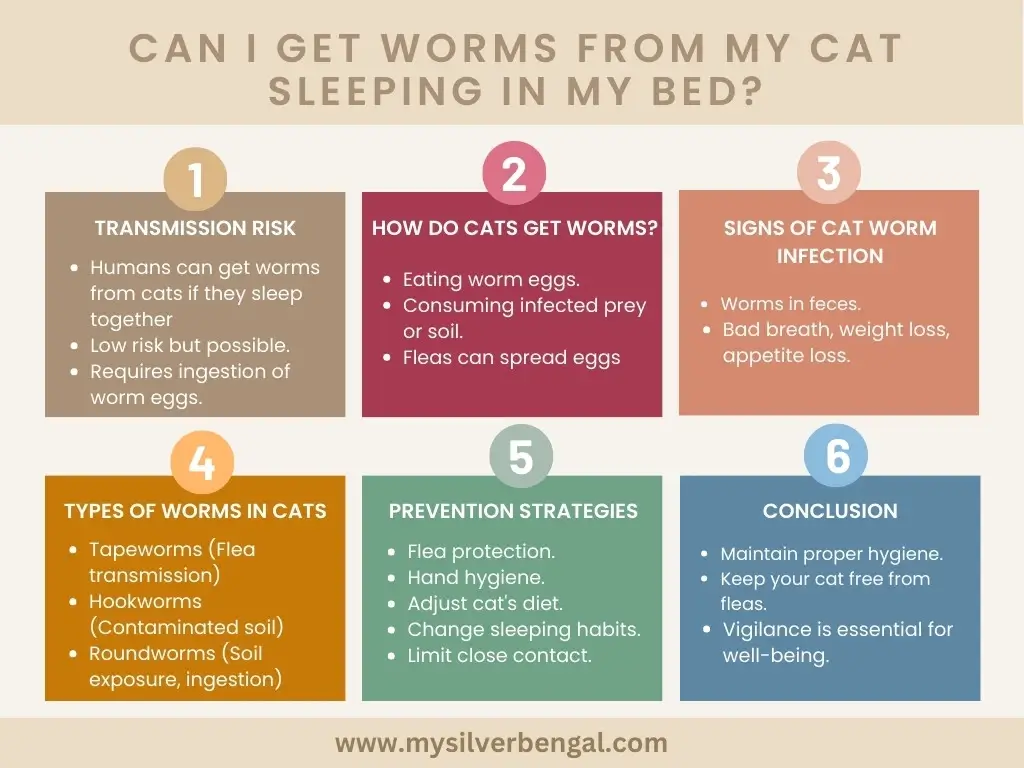Can I Get Worms From My Cat Sleeping In My Bed? Causes & Prevention

Cats are cute and much-loved pets. People enjoy snuggling with them whenever they can. However, a little problem can come with this affection – worms. Cats, like many other animals, can get infected with worms. The question often arises: “Can I get worms from my cat sleeping in my bed?” Yes, it’s possible, but the likelihood is relatively low.
This is something that many cat owners will have to deal with at some point. If your cat has worms and sleeps in bed, you might wonder if you can get them from them.
If your cat does, however, have worms, you could get them from your bed. Although it’s uncommon, it can happen. In this article, we’ll look at the transmission process and the different worm species that your cat might have.

Can I Get Worms From My Cat Sleeping In My Bed?
Humans can get worms from cats if they sleep in the same bed. The risk is not high, but it is still possible. The eggs that develop into worms can be transmitted to humans. However, you have to ingest the eggs for this to happen, which makes it harder for you to become infected.
The likelihood of contracting worms is increased by close contact. You might unintentionally eat the eggs if your cat is lying close to your face or if the eggs get on your bedding.
How Do Cats Get Worms?
By eating worm eggs, cats can contract worms. Additionally, they might consume worm-infected prey and contract the infection themselves. Upon discovering worms on the bed, owners wonder if their cat’s presence might be connected. Cats are curious and will explore anything, particularly if they can access the outside.
After walking through contaminated feces, all it takes for them to lick their paws is to swallow a worm egg and become infected. Maintaining your cat’s parasite-free status throughout the year is crucial because fleas can also spread worm eggs from cat to cat.
Signs That Indicate A Cat May Have Worms
You will notice the following symptoms if your cat becomes infected with worms. Remember that any of these symptoms could point to the presence of worms; they don’t all have to be present.
Types Of Worms Affecting Cats
| Type of Worm | Transmission to Cats | Transmission to Humans |
|---|---|---|
| Tapeworms | Flea transmission | Accidental ingestion of infected fleas |
| Hookworms | Eating contaminated soil | Skin penetration from infested soil |
| Roundworms | Various sources | Soil exposure, ingestion (e.g., from vegetables) |
Consequences Of Contracting Worms From My Cat
The most significant implications of contracting worms are as follows:
Jeopardizes Your Cat’s Health
Worms are a concerning issue that should be addressed promptly as they pose a significant risk to your cat’s health, potentially causing various mouth and stomach-related illnesses. Additionally, worms can make your cat appear lethargic and diminish the quality of its coat.
Mental and Financial Burden
Consider that the expenses can be substantial once the worm issue becomes unmanageable. Veterinary visits can be costly. However, taking proactive measures before the worm problem escalates can safeguard your cat’s health and save substantial money.
Transmission to Others
Finally, if not handled effectively, there’s a risk of passing these worms on to other pets or even members of your family.

Strategies For Worm Prevention In Your Cat
The first line of defense in preventing worms from getting to you is to protect your cat from fleas. By taking the following precautions, you can avoid getting fleas:
1. Bringing Awareness
Being aware of the potential risk of worm transmission is the first step. While children are more vulnerable to contracting worms from cats, everyone should exercise caution when handling or interacting with a cat known to have worms.
2. Changing Diet Plan
If your cat has contracted worms, adjusting its diet is essential. High-quality wet food is recommended as it helps prevent dehydration and is gentle on your cat’s stomach.
3. Hand Hygiene
You wake up to find what appears to be worms on bed, and you start to wonder if your cat sleeping there could be the cause. Therefore, proper hand hygiene is crucial in preventing worm transmission. After touching any part of your cat’s body, especially after cleaning the litter box, washing your hands is essential.
Consider wearing gloves when dealing with the litter box, and make it a routine to disinfect the surrounding floor area. Our experts also advise on using quality litter sand.
Dried Tapeworm Segments In My Bed – What To Do?
Dried or not, tapeworm segments can’t infect your cat or other pets if eaten. They need an in-between host, usually a flea, for the infection to occur when a cat swallows a tapeworm-infected flea.
To prevent tapeworms in cats, use flea prevention, avoid rodents and garbage, and thoroughly clean your home, including vacuuming and washing bedding, to eliminate tapeworm segments and fleas.
4. Changing Sleeping Arrangements
When your cat has worms, it’s advisable to modify sleeping arrangements. Avoid allowing your cat into your bed – this might lead to bed worms – until the infection is completely cleared.
If your cat frequents shared furniture, such as couches or chairs, ensure daily vacuuming and cleaning to minimize the risk of spreading worms to others in your household.

5. Limiting Interaction
While you should limit close contact to reduce the risk of worm transmission, this doesn’t mean you should avoid all interactions with your cat.
Your cat still needs attention and support during this time. However, thoroughly clean the toys and wash your hands after playing or petting your cat. You should specifically look for tiny bed worms in cat beds.
6. Veterinary Care
Regular veterinary care is essential in preventing and managing worm infestations. Schedule annual vet visits to check for parasites and follow your vet’s recommendations for deworming treatments.
Treatment often involves medication to eliminate the bed worm parasites, which may need to be administered in multiple doses at home.
7. Preventative Measures
Dealing with worms on bed can be unsettling. Use flea, tick, and mosquito treatments your vet recommends to prevent worm larvae transmission from external parasites, including heartworms. These preventive measures can help safeguard your cat from future infestations.
Conclusion
While the risk of contracting parasites from your cat remains relatively low as long as you maintain proper hygiene and take measures to keep your cat free from fleas, vigilance in the battle against fleas, ticks, and other pests is essential for your and your pet’s well-being, ensuring many more enjoyable moments together.
If your cat does have a worm infection, it’s crucial to keep them out of your bed to avoid accidentally ingesting bed worm parasites. Simple precautions like washing your hands after interacting with your cat, using gloves when cleaning the litter box, and regularly disinfecting the area around it can help prevent infestations. Remember that cat worm infestations are treatable, allowing you to maintain a parasite-free household until your cat fully recovers.
FAQs






